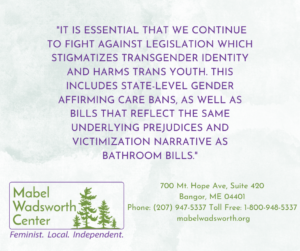Reflecting on the Maine 131st legislative session
Comments Off on Reflecting on the Maine 131st legislative sessionNow that the uncharacteristically long Maine legislative session has wrapped up, it feels like a great time to celebrate the wins we’ve had with bills that help fulfill our state’s motto: “The Way Life Should Be.” You’re probably already familiar with LD 1619, an important bill for abortion access in the state that received a lot of attention, but you may not know about some of the other exciting bills that were signed into law over the last months! Along with other proactive abortion bills, we saw many pro-trans bills become law in Maine, providing a sharp contrast with anti-trans laws that have been implemented across the country. Read below to see some of these new laws! Bills with an asterisk (*) are the first of their kind in the United States.
LD 1343: Sponsored by Bangor’s own Rep. Supica, this bill makes it so that no town or municipality can pass local ordinances to restrict abortion access.
LD 616: This law strengthens protections for healthcare providers so that they may offer care to people traveling to Maine for abortion care safely, without threats to their ability to practice medicine.
LD 935: This bill requires private health insurance to cover abortion care without cost-sharing, or before you’ve hit your deductible.
*LD 956: This bill improves LGBTQ+ data collection in healthcare settings, which has been shown to improve health outcomes for LGBTQ+ people.
*LD 942: This bill requires nonbinary inclusion on state forms and databases.
*LD 1507: This bill will require the state to offer reissued marriage certificates following gender marker change and gender self-affirmation on death certificates.
LD 1040: This bill makes MaineCare coverage of gender-affirming care state law (rather than just an executive order).
LD 489: This bill updates how the Maine Human Rights Act protects trans youth in schools.
*LD 535: This bill improves gender-affirming care access for trans youth by allowing access to gender-affirming care without parental consent or notification for 16- and 17-year-olds. This is similar to Maine laws regarding abortion access or contraception for minors.
LD 1683: This bill provides a path for civil recovery (as opposed to working through the often retraumatizing criminal justice system) for victims of “stealthing,” or the act of nonconsensually tampering with or removing a condom during sex. This bill also includes considerations around sexual assault when evaluating parental rights.
These important new laws would not be possible without the work of the legislators sponsoring and cosponsoring the bills, the organizations that advocated for them, or the individuals that provided testimony.
There are other new laws to be celebrated as well, along with pieces of legislation that did not become law to mourn. LD 199 sought to improve the health and wellbeing of all Mainers by removing restrictions for access to MaineCare for immigrants, and did not pass in the legislature. LD 2004 was a bill that would have amended the unjust 1980 Maine Indian Claims Settlement Act and provide members of the Wabanaki Nations with the protections that all other federally recognized tribes are provided. While LD 2004 did pass in the House and Senate with a strong bipartisan majority, it was vetoed by the Governor and the veto was not overridden when brought back to the House and Senate. Both new Mainers and members of Wabanaki Nations deserve better.



